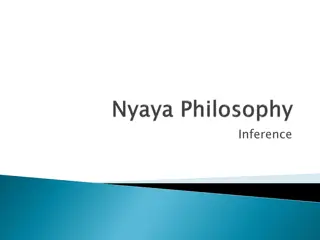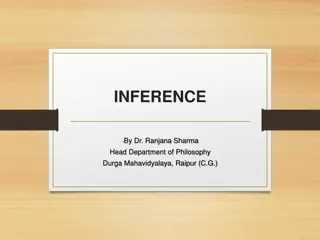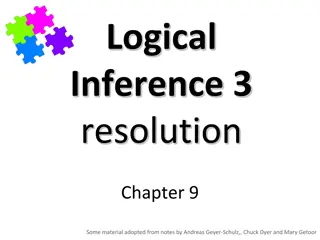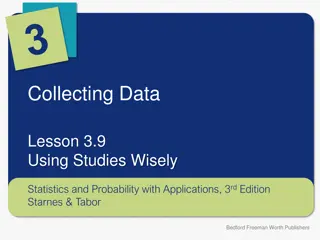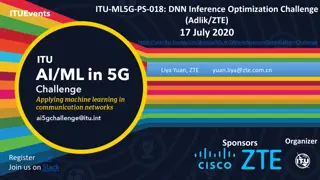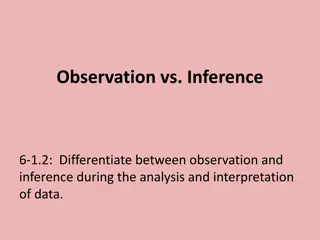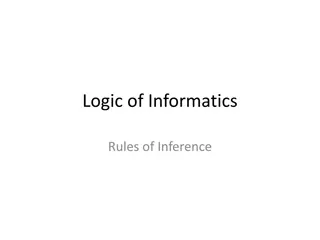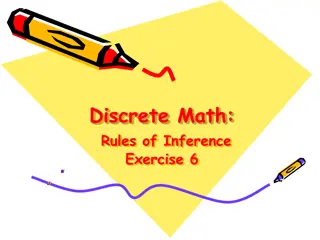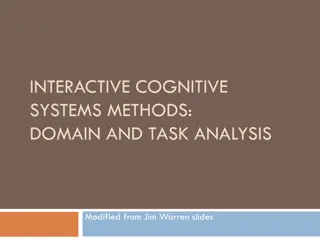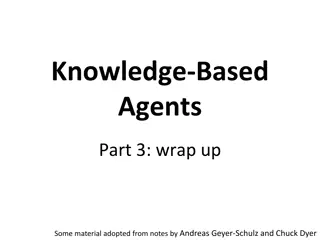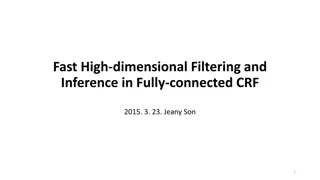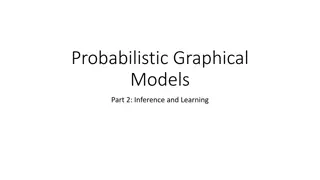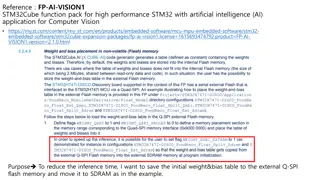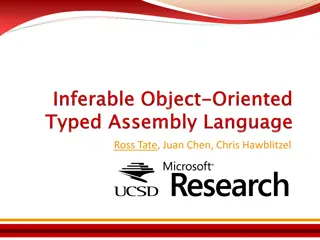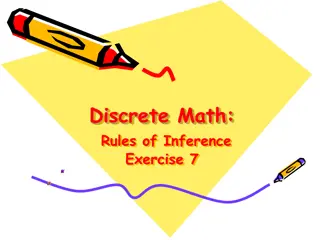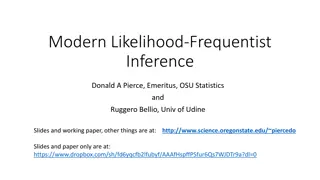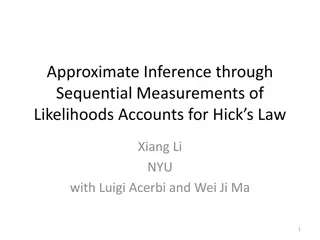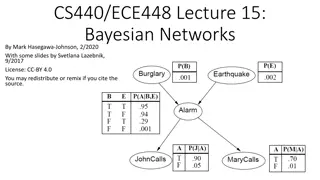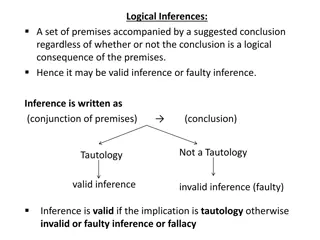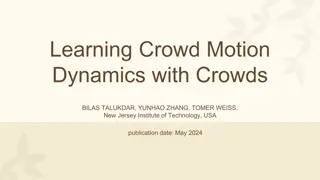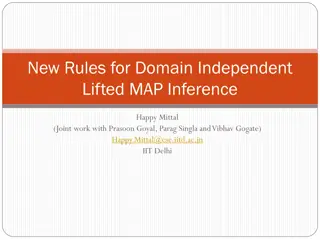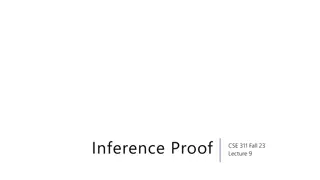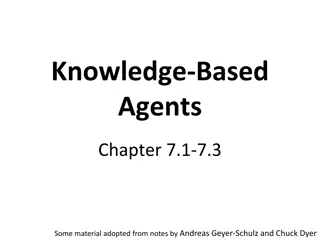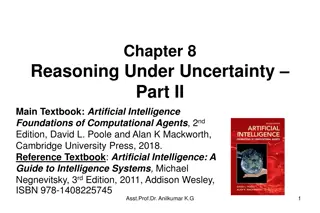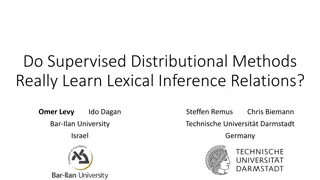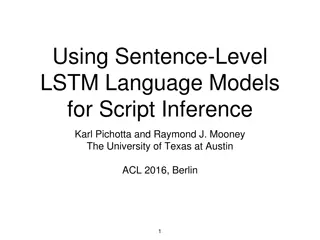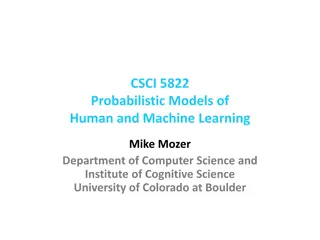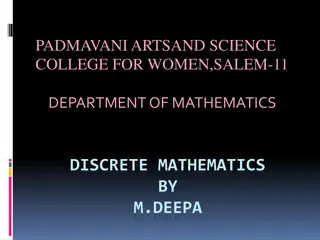Inference and Vyapti in Logic
Inference, known as Anumana in Sanskrit, is the process of deriving knowledge based on existing information or observations. It can be used for personal understanding or to demonstrate truths to others. An inference may be SvArtha (for oneself) or ParArtha (for others). Vyapti, the invariable concom
2 views • 14 slides
Inference in Indian Philosophy
In Indian philosophy, inference is considered one of the six ways to attain true knowledge. It involves three constituents: Hetu (middle term), Sadhya (major term), and Paksha (minor term). The steps of inference include apprehension of the middle term, recollection of the relation between middle an
13 views • 8 slides
Resolution in Logical Inference
Resolution is a crucial inference procedure in first-order logic, allowing for sound and complete reasoning in handling propositional logic, common normal forms for knowledge bases, resolution in first-order logic, proof trees, and refutation. Key concepts include deriving resolvents, detecting cont
6 views • 12 slides
Scope of Inference in Statistical Studies
Statistical studies require careful consideration of the scope of inference to draw valid conclusions. Researchers need to determine if the study design allows generalization to the population or establishes cause and effect relationships. For example, a study on the effects of cartoons on children'
2 views • 15 slides
DNN Inference Optimization Challenge Overview
The DNN Inference Optimization Challenge, organized by Liya Yuan from ZTE, focuses on optimizing deep neural network (DNN) models for efficient inference on-device, at the edge, and in the cloud. The challenge addresses the need for high accuracy while minimizing data center consumption and inferenc
7 views • 13 slides
The Difference Between Observation and Inference
Learn to differentiate between observation (direct facts or occurrences) and inference (interpretations based on existing knowledge or experience) through examples such as the Sun producing heat and light (observation) and a dry, itchy skin leading to the inference that it is dry. The distinction be
4 views • 14 slides
Navigating Statistical Inference Challenges in Small Samples
In small samples, understanding the sampling distribution of estimators is crucial for valid inference, even when assumptions are violated. This involves careful consideration of normality assumptions, handling non-linear hypotheses, and computing standard errors for various statistics. As demonstra
5 views • 19 slides
Rules of Inference in Logic
Dive into the world of logic with this detailed exploration of rules of inference. Learn about different types of arguments, such as Modus Ponens and Modus Tollens, and understand how to determine the validity of an argument. Discover the purpose of rules of inference and unravel the logic behind co
0 views • 17 slides
Rules of Inference Exercises and Solutions in Discrete Mathematics
Explore exercises and solutions in discrete mathematics focusing on rules of inference. Analyze logical premises and draw relevant conclusions using rules such as modus tollens, modus ponens, and disjunctive syllogism. Understand the application of these rules in different scenarios to reach valid d
5 views • 4 slides
Expert Systems and Knowledge Inference
Expert Systems (ES) act as synthetic experts in specialized domains, emulating human expertise for decision-making. They can aid users in safety, training, or decision support roles. Inference rules and knowledge rules play key roles in ES, helping in problem-solving by storing facts and guiding act
1 views • 63 slides
Knowledge-Based Agents: Inference, Soundness, and Completeness
Inference, soundness, and completeness are crucial concepts in knowledge-based agents. First-order logic allows for expressive statements and has sound and complete inference procedures. Soundness ensures derived sentences are true, while completeness guarantees all entailed sentences are derived. A
4 views • 6 slides
Fast High-Dimensional Filtering and Inference in Fully-Connected CRF
This work discusses fast high-dimensional filtering techniques in Fully-Connected Conditional Random Fields (CRF) through methods like Gaussian filtering, bilateral filtering, and the use of permutohedral lattice. It explores efficient inference in CRFs with Gaussian edge potentials and accelerated
3 views • 25 slides
Probabilistic Graphical Models Part 2: Inference and Learning
This segment delves into various types of inferences in probabilistic graphical models, including marginal inference, posterior inference, and maximum a posteriori inference. It also covers methods like variable elimination, belief propagation, and junction tree for exact inference, along with appro
1 views • 33 slides
Optimizing Inference Time by Utilizing External Memory on STM32Cube for AI Applications
The user is exploring ways to reduce inference time by storing initial weight and bias tables in external Q-SPI flash memory and transferring them to SDRAM for AI applications on STM32Cube. They have questions regarding the performance differences between internal flash memory and external memory, r
5 views • 4 slides
Typed Assembly Language and Type Inference in Program Compilation
The provided content discusses the significance of typed assembly languages, certifying compilers, and the role of type inference in program compilation. It emphasizes the importance of preserving type information for memory safety and vulnerability prevention. The effectiveness of type inference me
8 views • 17 slides
Rules of Inference Exercise Solutions in Discrete Math
This content provides solutions to exercises involving rules of inference in discrete mathematics. The solutions explain how conclusions are drawn from given premises using specific inference rules. Examples include identifying whether someone is clever or lucky based on given statements and determi
0 views • 4 slides
Modern Likelihood-Frequentist Inference: A Brief Overview
The presentation by Donald A. Pierce and Ruggero Bellio delves into Modern Likelihood-Frequentist Inference, discussing its significance as an advancement in statistical theory and methods. They highlight the shift towards likelihood and sufficiency, complementing Neyman-Pearson theory. The talk cov
3 views • 22 slides
Sequential Approximate Inference with Limited Resolution Measurements
Delve into the world of sequential approximate inference through sequential measurements of likelihoods, accounting for Hick's Law. Explore optimal inference strategies implemented by Bayes rule and tackle the challenges of limited resolution measurements. Discover the central question of refining a
2 views • 29 slides
Bayesian Networks for Efficient Probabilistic Inference
Bayesian networks, also known as graphical models, provide a compact and efficient way to represent complex joint probability distributions involving hidden variables. By depicting conditional independence relationships between random variables in a graph, Bayesian networks facilitate Bayesian infer
1 views • 33 slides
Logical Inferences and Rules of Inference
Logical inferences involve drawing conclusions from premises, which can either be valid or invalid based on the rules of inference. This includes Modus Ponens, Hypothetical Syllogism, DeMorgan's Law, and Law of Contrapositive. Invalid inferences result in fallacies like denying the antecedent. Exerc
2 views • 18 slides
Dynamic Crowd Simulation Using Deep Reinforcement Learning and Bayesian Inference
This paper introduces a novel method for simulating crowd movements by combining deep reinforcement learning (DRL) with Bayesian inference. By leveraging neural networks to capture complex crowd behaviors, the proposed approach incorporates rewards for natural movements and a position-based dynamics
3 views • 15 slides
New Rules for Domain-Independent Lifted MAP Inference
In this work by Happy Mittal and team at IIT Delhi, new rules for domain-independent lifted MAP inference are introduced. The study covers motivations, notations, preliminaries, and two main rules. Markov Logic Networks (MLN) are discussed along with examples illustrating friendship, smoking habits,
3 views • 56 slides
Inference Proof
Abstract reasoning in computer science involves inference proofs where facts are combined to derive new information. The process is formal yet flexible, allowing for complex proofs to be verified with precision. Understanding and utilizing inference rules expand the boundaries of provable statements
2 views • 51 slides
Knowledge-Based Agents: Logic, Inference, and Reasoning Strategies
The foundations of knowledge-based agents, this content delves into logic, inference, and diverse human reasoning strategies. It explores the power of logical reasoning in solving AI problems and discusses how people navigate logical inference challenges. Additionally, it touches on cognitive psycho
2 views • 53 slides
Discrete Math: Rules of Inference Exercise 5
This exercise explores a classic argument in logic: "All men are mortal. Socrates is a man. Therefore, Socrates is mortal." It identifies the rules of inference involved, primarily universal instantiation and modus ponens. By applying these rules, we derive conclusions based on established premises.
2 views • 4 slides
Probabilistic Inference and Variable Elimination in Belief Networks
Probabilistic inference plays a crucial role in computing posterior distributions in belief networks. Exact and approximate inference methods are explored, including variable elimination algorithms. Conditional probability tables are used to represent probabilities efficiently.
4 views • 49 slides
Supervised Distributional Methods for Lexical Inference Relations
This study delves into whether current supervised distributional methods effectively learn lexical inference relations. It compares supervised and unsupervised methods, evaluates the learning capabilities, and discusses the implications for lexical inference tasks. Through experiments with various w
0 views • 30 slides
Using Sentence-Level LSTM Language Models for Script Inference
Event Inference Motivation: Building a Question Answering system requires the inference of probable implicit events. Explore how sentence-level LSTM language models can aid in script inference for improved understanding and context analysis. Delve into the methods, experiments, and conclusions drawn
1 views • 47 slides
Probabilistic Models of Human and Machine Learning Techniques
Explore various inference techniques, including exact inference, variable elimination, belief propagation, and more, in the context of probabilistic models of human and machine learning. Learn about common inference problems, notation, and exact inference in Bayes Nets.
5 views • 33 slides
Calibrated Bayesian Approach for Survey Inference
Explore the Calibrated Bayesian approach for sample survey inference, including understanding different modes of inference, mechanics of Bayesian inference, and incorporating survey design features. Learn about models for complex surveys and key aspects of survey inference methods. Gain insights int
1 views • 81 slides
Logic Programming in Prolog and Resolution Inference
Dive into the world of logic programming with Prolog - a widely used language for symbolic manipulation and rapid prototyping. Explore concepts like backward chaining, infinite loops, redundant inference, and resolution in First Order Logic. Uncover the fundamentals of logic programming algorithms a
2 views • 17 slides
Causal Inference in Machine Learning
Explore the realm of causal reasoning and inference in machine learning, encompassing the discovery of causal relationships from data, heterogeneous treatment effects, automated causal inference, and more. Delve into the complexities of causal discovery and the effects of causes, shedding light on h
4 views • 22 slides
Causal Inference Research Areas and Projects Overview
Explore a comprehensive overview of research areas in causal inference, including unmeasured confounding, network analysis, psychometrics, transfer learning, and more. Delve into notable papers and projects, such as sensitivity analysis in genomic experiments and causal inference with latent variabl
4 views • 18 slides
Logical Inference: Propositional Logic Model Checking and Efficient Algorithms
Overview of logical inference covering model checking for propositional logic, rule-based reasoning in first-order logic, and efficient PL model checking algorithms like DPLL. The content explores various inference rules, resolution-based reasoning, and techniques for determining entailment between
0 views • 11 slides
Discrete Mathematics: Validity, Inference Rules, Consistency, and Set Theory
Explore the foundational concepts of discrete mathematics, including theory of inference, rules of inference, consistency of premises, statement functions, variables, quantifiers, free and bound variables, set theory, functions, and composition of functions. Delve into the logical reasoning behind s
4 views • 21 slides
Stochastic Collapsed Variational Bayesian Inference for Latent Dirichlet Allocation
Conducting Latent Dirichlet Allocation models on Wikipedia using various inference methods such as Stochastic Variational Inference and Collapsed Variational Inference. The process involves optimizing and evaluating log likelihoods and computational times for different document sizes.
1 views • 36 slides
Propositional Logic Reasoning: Rules, Inference, and Resolution
Delve into the principles of reasoning with propositional logic through inference rules, sound reasoning, and the powerful resolution inference rule. Learn how to create new sentences, detect inconsistencies, and apply sound rules of inference. Dive into resolution refutation and understand how to u
2 views • 16 slides
Automated Inference in First-Order Logic: Techniques and Applications
Learn how to perform automated inference in First-Order Logic through reduction to propositional inference, Horn theories, resolution theorem proving, variable substitution, and lifted inference algorithms.
3 views • 37 slides
VIAC Rules 2021 Key Changes and Features in Ukrainian Arbitration Forum
Explore the key changes and features of the VIAC Rules 2021, focusing on the Ukrainian Arbitration Forum. Learn about lean and flexible rules, joinder of third parties, expedited proceedings, Vienna as the fall-back seat, third-party funding provision, competitive fee structure, VIAC Portal, and mor
2 views • 22 slides
Type Inference in Programming Languages
Explore the concept of type inference in programming languages, understanding static and dynamic typing, type-checking processes, and key steps involved in determining types for bindings. Learn how type inference can be easy, difficult, or impossible, and appreciate its significance in program analy
0 views • 16 slides
